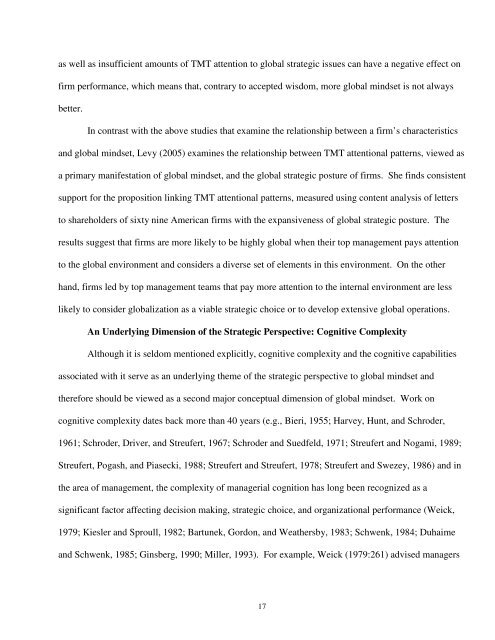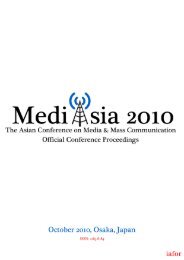What We Talk About When We Talk About “Global Mindset”
What We Talk About When We Talk About “Global Mindset”
What We Talk About When We Talk About “Global Mindset”
Create successful ePaper yourself
Turn your PDF publications into a flip-book with our unique Google optimized e-Paper software.
as well as insufficient amounts of TMT attention to global strategic issues can have a negative effect on<br />
firm performance, which means that, contrary to accepted wisdom, more global mindset is not always<br />
better.<br />
In contrast with the above studies that examine the relationship between a firm’s characteristics<br />
and global mindset, Levy (2005) examines the relationship between TMT attentional patterns, viewed as<br />
a primary manifestation of global mindset, and the global strategic posture of firms. She finds consistent<br />
support for the proposition linking TMT attentional patterns, measured using content analysis of letters<br />
to shareholders of sixty nine American firms with the expansiveness of global strategic posture. The<br />
results suggest that firms are more likely to be highly global when their top management pays attention<br />
to the global environment and considers a diverse set of elements in this environment. On the other<br />
hand, firms led by top management teams that pay more attention to the internal environment are less<br />
likely to consider globalization as a viable strategic choice or to develop extensive global operations.<br />
An Underlying Dimension of the Strategic Perspective: Cognitive Complexity<br />
Although it is seldom mentioned explicitly, cognitive complexity and the cognitive capabilities<br />
associated with it serve as an underlying theme of the strategic perspective to global mindset and<br />
therefore should be viewed as a second major conceptual dimension of global mindset. Work on<br />
cognitive complexity dates back more than 40 years (e.g., Bieri, 1955; Harvey, Hunt, and Schroder,<br />
1961; Schroder, Driver, and Streufert, 1967; Schroder and Suedfeld, 1971; Streufert and Nogami, 1989;<br />
Streufert, Pogash, and Piasecki, 1988; Streufert and Streufert, 1978; Streufert and Swezey, 1986) and in<br />
the area of management, the complexity of managerial cognition has long been recognized as a<br />
significant factor affecting decision making, strategic choice, and organizational performance (<strong>We</strong>ick,<br />
1979; Kiesler and Sproull, 1982; Bartunek, Gordon, and <strong>We</strong>athersby, 1983; Schwenk, 1984; Duhaime<br />
and Schwenk, 1985; Ginsberg, 1990; Miller, 1993). For example, <strong>We</strong>ick (1979:261) advised managers<br />
17









